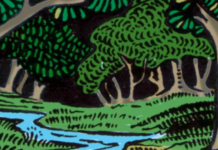
Not In Kansas Anymore: Dark Arts, Sex Spells, Money Magic, and Other Things Your Neighbors Aren’t Telling You, by Christine Wicker
HarperSanFrancisco, 0060726784, 275 pp. (incl. sources and bibliography), 20051
Wicker is a religious reporter, who, two years prior to writing the book, had no idea that people ‘still believe in magic’. She repeatedly makes it clear that she doesn’t believe any of this magick stuff in a way that is rather condescending, given this is the subject and subculture she decided to tackle. She claims an irreligious stance herself in the beginning of the book, yet ends up in church by the end. Irreligious in practice initially, perhaps, but it becomes clear that her Christian upbringing heavily informs her prejudices throughout the book. This need not necessarily be a detracting factor, yet Wicker makes it so.
She frequently references a traumatizing event with a banana in her childhood, where she took the larger of the two offered and found it rotten. She interprets this as ‘bad magic’, which doesn’t quite follow with any sensible occult teaching. It could be interpreted in light of Wiccan karma perhaps, but this is not a widely accepted magickal law, and the subject is not approached from that perspective. Further, she claims paranoid fantasies, constantly visualizing death for herself and imagining the destruction of all she holds dear. She also interprets this as ‘bad magic’, though it is unclear how such bizarre fantasies, which have no tangible effects, relate to magick in any way. She acknowledges not everyone views good and evil (or ‘good magic’ and ‘bad magic’) in such black and white terms, yet she can’t seem to step outside this box herself, and enters every exploration with many prejudices she seems reluctant to depart from, and in most cases, fails to do so.
The subtitle and dustjacket description may lead one to believe that this book intends to illustrate the recent cultural effects of magick and occultism in America today, but unfortunately that is not what this book delivers. Briefly, Wicker touches upon America’s occult history, with Puritanism and Christian magic, and moves on to the new age movement of the sixties and then to the “positive thinking” of the eighties, swiftly and without evaluation, failing to note their influence in modern society in general.
The book opens with the author attending a vampire ball, and it becomes clear she assumes a direct association between vampire, Otherkin and magickal communities, but while there are some overlaps, no direct correlation exists. To her, vampires are “magic people”, Wiccans are “magic people”, hoodoo practitioners are “magic people”, and she often refers to “non-magic people” as “muggles”.
The words Pagan and Paganism always appear in lowercase, which is highly disrespectful. It is worth noting that the same treatment is not given to Christianity, Buddhism, and other religious traditions presented here. Further, she states that “witches are often called Wiccans”,2 when in actuality a distinction is usually made between a practitioner of witchcraft and a member of the Wiccan religion. She also confuses Drawing Down the Moon, a Wiccan rite which calls the Goddess into oneself, with the Great Rite, a ritual involving sexual intercourse, often symbolically.3
She was horrified by the practices of Aleister Crowley and Gerald Gardner and makes a number of disapproving comments regarding each (the former, especially), but her information seems entirely second- or even third-hand as she does not appear to have read any works by either author (no works are mentioned in the seven page bibliography). As a result, her opinions seem uninformed and heavily influenced by fear and repression.
Rather than the cultural history implied in the subtitle, Wicker offers us a chatty and highly judgemental view of her personal experiences with several distinctly fringe occult communities and personalities. Unfortunately, she limits herself to selectively picking and choosing whoever appears oddest to her, rather than exploring the full range of occult practice and belief. As a result, she often finds herself extremely uncomfortable with the situations she puts herself in, and often comments that she can’t handle her brushes with expanding consciousness, and so retreats the moment she encounters a belief which contradicts her current worldview, head spinning, fearful of change.
Wicker seems to feel she was enriched by her experiences, but alas, she comes off as nothing more than a blundering, ignorant tourist for failing to engage, and the caricatures she portrays of the people she encountered insult more than illuminate. Not recommended.








